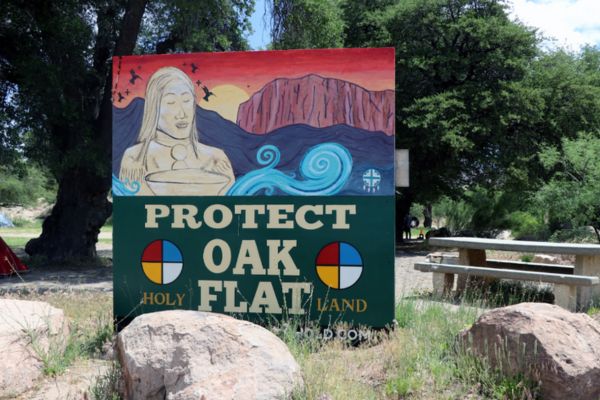
- Details
- By Levi Rickert
President Donald Trump took a strong stance on Tuesday on the ongoing Resolution Copper dispute, issuing pointed criticism of the 9th Circuit Court of Appeals following its decision to temporarily halt the planned land transfer.
Trump's response came one day after the 9th U.S. Circuit Court of Appeals issued an emergency injunction on Monday, temporarily blocking the Trump administration’s plan to transfer Oak Flat—a sacred and ecologically sensitive area in Arizona—to a private mining company. The decision comes as three separate lawsuits challenging the controversial land exchange continue to move through the courts.
Continuing a familiar theme from his presidency, Trump accused the court of overstepping its authority, labeling its actions as politically driven rather than grounded in law. His remarks echo longstanding grievances he expressed during his time in office, when he often accused the 9th Circuit of ideological bias.
"The Radical Left 9th Circuit Court just ruled against the biggest copper mine in the United States," Trump stated on his Truth Social platform, setting the tone for his opposition to the ruling.
He further escalated his rhetoric by portraying resistance to the Resolution Copper project as unpatriotic. Trump described critics of the initiative as aligned with foreign competitors, casting the mine's development as a matter of national economic interest.
In particularly striking language, Trump suggested that opponents of the Resolution Copper project are "Anti-American, and representing other copper competitive countries." This framing attempts to position the mining project as a matter of national interest and economic patriotism.
Dr. Wendsler Nosie Sr. of Apache Stronghold response to President Trump:
"Our nation cannot survive if we sacrifice what is sacred in pursuit of temporary profits.
Today, President Trump said he wants to destroy our holy ground of Oak Flat so a foreign-owned corporation can send copper to China. Whether you’re Republican, Democrat, or neither, that is a terrible deal for the American people.
But this fight is much bigger than politics or profit. This is a fight about our identity as a nation.
Do we respect religious freedom? Will we safeguard our environment for our children and grandchildren? Or will we sacrifice it all for corporate greed?
We’re grateful that we’ve been joined in our struggle by people of many faiths—Catholics, Protestants, Muslims, Jews, and more—and people of every political persuasion. That’s because this is not a partisan issue. It is a moral one.
If we destroy our sacred land and poison our environment, we are betraying our children and grandchildren and hurting ourselves. The future of the entire human race is at stake.
Three times now, courts have stopped this destructive project. That is because it is unjust, bad for our nation, and bad for the world. We hope the courts will stop the destruction of Oak Flat once and for all.
No matter what happens, I call on all people to continue to pray for justice and to stand with us in protecting Oak Flat. By protecting Oak Flat, we protect our children and grandchildren, protect Mother Earth, and protect everything that is sacred."
More Stories Like This
Feds release draft long-term plans for Colorado River managementApache Leader Walks 60 Miles to Court Hearing That Will Decide Fate of Sacred Oak Flat
Rappahannock Tribe Raises Sovereignty and Environmental Concerns Over Caroline County Water Permit
Klamath Indigenous Land Trust Purchases 10,000 Acres as Salmon Return
Trump signs law that revokes some limits on drilling in Alaska’s National Petroleum Reserve
Help us defend tribal sovereignty.
At Native News Online, our mission is rooted in telling the stories that strengthen sovereignty and uplift Indigenous voices — not just at year’s end, but every single day.
Because of your generosity last year, we were able to keep our reporters on the ground in tribal communities, at national gatherings and in the halls of Congress — covering the issues that matter most to Indian Country: sovereignty, culture, education, health and economic opportunity.
That support sustained us through a tough year in 2025. Now, as we look to the year ahead, we need your help right now to ensure warrior journalism remains strong — reporting that defends tribal sovereignty, amplifies Native truth, and holds power accountable.
 The stakes couldn't be higher. Your support keeps Native voices heard, Native stories told and Native sovereignty defended.
The stakes couldn't be higher. Your support keeps Native voices heard, Native stories told and Native sovereignty defended.
Stand with Warrior Journalism today.
Levi Rickert (Potawatomi), Editor & Publisher


